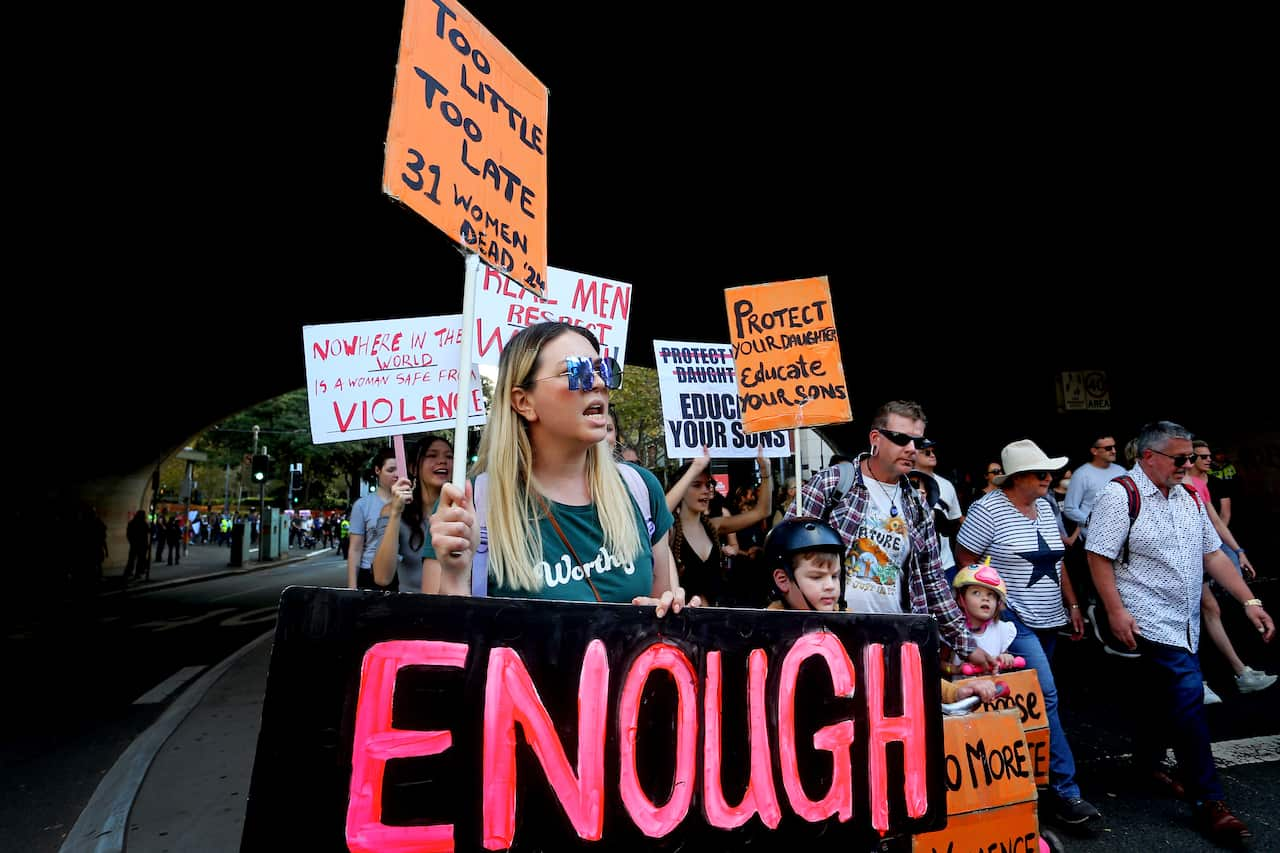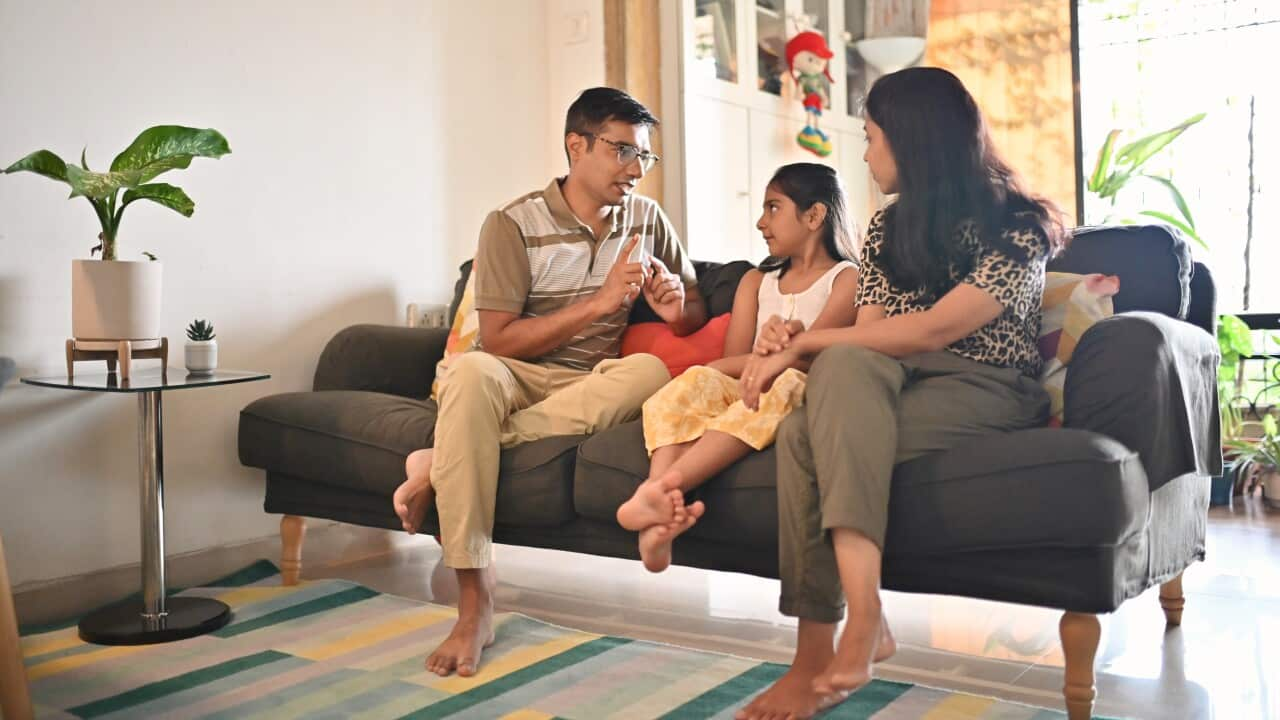As Australia confronts the shocking numbers of men murdering women, children and young people may have questions or want to talk about violence against women and children.

Demonstrators take part in a national rally against violence towards women in Sydney on 27 April 2024. Source: Getty / Lisa Maree Williams
If you are a parent you may also be wondering how you can help your child develop the attitudes and skills they need to have healthy and respectful relationships throughout their lives.
While there has been consistent messaging that “we all have a role to play” when it comes to stopping violence against women, actual guidance on what parents should do can be difficult to find.
Talking to your kids about recent events
Be guided by the questions your child asks and keep your response simple. Young people will typically ignore anything that exceeds their current needs. But don’t be afraid to ask your child about their thoughts first. It can be a useful way to know what they understand.
If you feel they are overly anxious about these events, it could be a good idea to seek professional advice from someone like a school counsellor or GP.
How to approach gender and relationships
There are many things parents and carers can do to help the children and young people in their lives develop healthy ideas about gender and relationships. Here are seven ideas:
1. Model respect
This includes respecting other people’s boundaries. For example, you might seek permission before hugging someone, or ask people if it’s okay to share a picture of them on social media.

One of the most important things adults can do is to model respect for others, both offline and online. Source: AAP / Jane Dempster
This is particularly important as research shows young people want less fear-based messaging from adults and more practical guidance on how to have good partnerships.
2. Point out and talk about stereotypes
Take advantage of these opportunities to instil more accurate messages. You can tell your child most relationships don’t play out like a romantic comedy film or “reality” dating show. Falling in love might be easy, but staying in love often takes work and communication.
Encourage your child to dress, play, study and engage in activities that bring them joy with less concern for what society might “expect” them to do.
3. Teach your child to stick up for themselves and others
There are various ways to approach this. You might encourage them to speak up and challenge the behaviour, to use their body language to show they don’t approve of what is happening, or at least redirect everyone’s focus onto something else.

Encourage your child to dress, play, study and engage in activities that bring them joy with less concern for what society might “expect” them to do. Source: AAP / Image
They might also be able to ask a third party to get involved and help intervene.
Sometimes, there isn’t much you can do in the moment, or it might not be safe to directly involve yourself. The best thing to do in these moments is to at least check in afterwards with the person who has been harassed to make sure they’re OK.
4. Don’t have different messages for boys and girls
Try not to have different messages for boys or girls. Partly, this is because many young people today see themselves as something other than male or female, but more importantly we want everyone to receive the same key information and to develop the same skills.
5. Avoid lectures and look for everyday opportunities to chat
For example, you could share your thoughts about a news report, a movie scene you’re watching together, or a song on the radio.
6. Provide other information
If, for whatever reason, a child won’t listen to their parents, ensure they have a support network of other trusted adults they can rely on. This could be people like another family member, a close family friend, a school teacher or a sports coach.
7. Think about your upbringing
So it can be a good idea to challenge or discount anything that is unhelpful or impacts our ability to model or speak openly about respectful relationships.
More resources
Here are some websites and podcasts with information and advice for parents on how to talk to their children about gender, sexuality, violence against women and respect.
- is a free West Australian government resource to help parents talk to children (from infancy to 18) about sex.
- is a free WA government resource for Aboriginal parents and carers to talk about safe and healthy relationships with their kids.
- is a free federal government resource for parents to talk to their children about respect for women and gender inequality.
- is a free podcast by the federal government’s Stop it at the Start Campaign and NOVA Entertainment. It follows the story of 10-year-old Ari, “the world’s first artificial intelligence prototype, as he tries to wrap his ‘data brain’ around the human experience”. It is designed to be a funny series to teach kids about respectful behaviour.
- has free and paid resources for parents about sex education and pornography, split into topics and ages. The site is run by sex educator Cath Hakanson.
- is the website of sexual health educator Vanessa Hamilton, with free tips, scripts for talking to your children and book recommendations.
- is a free podcast by Sexual Health Victoria. Every episode contains different relationships and sexuality advice for parents and carers. Topics vary from gender pronouns to pornography and taking care of your body.
